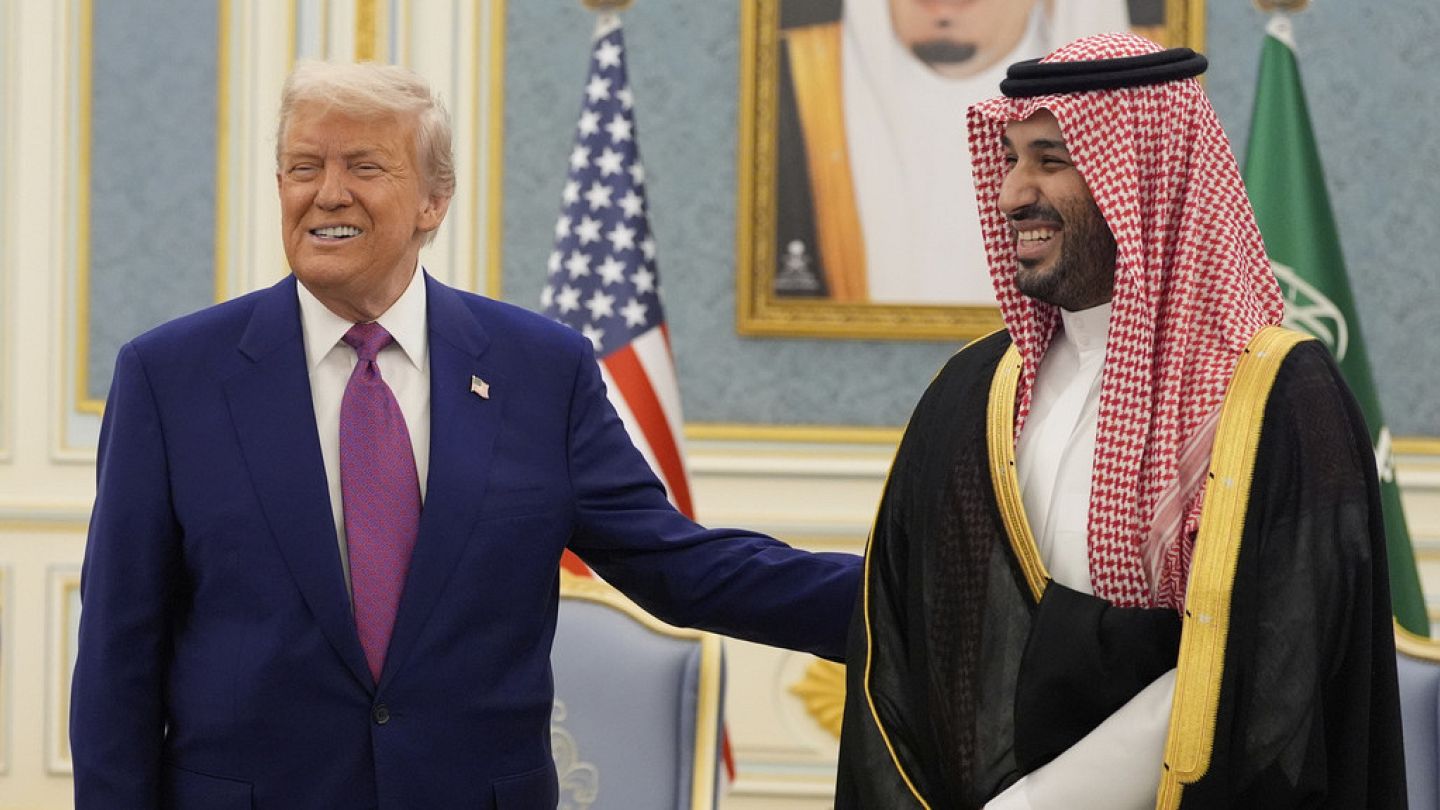Trump joined by Musk in Saudi Arabia as US seeks major investment from Gulf states
Following his visit to the Saudi capital Riyadh, US President Donald Trump's regional tour includes trips to Qatar and the United Arab Emirates (UAE).
US President Donald Trump started a tour of major Gulf nations on Tuesday with a visit to Saudi Arabia, where he is seeking to secure hundreds of billions of dollars in investments from one of Washington's most important partners in the Middle East. Trump was welcomed at the airport in the Saudi capital Riyadh by the country's de facto ruler Crown Prince Mohammed bin Salman, who is otherwise known as MBS. A bilateral meeting between the leaders was followed by a lunch at Riyadh’s royal court, which was attended by several high-profile US business executives, including BlackRock CEO Larry Fink and OpenAI CEO Sam Altman. Also in tow was Tesla mogul and Trump adviser Elon Musk, who was pictured speaking to the US president and MBS at the lunch.Trump picked Saudi Arabia for his first major overseas trip since returning to the White House in January — although he did travel to Italy last month for the funeral of Pope Francis — because the kingdom has vowed to make large investments in the US.MBS has already committed to some $600 billion (€540bn) in new Saudi investment in the US, but Trump has teased that he wants $1 trillion (€890bn). "I really believe we like each other a lot," Trump said on Tuesday while sitting next to the crown prince at the start of their bilateral meeting.Later on Tuesday, Trump is set to take part in a US-Saudi investment conference before being feted with a lavish state dinner. The other two countries on Trump's itinerary are Qatar and the United Arab Emirates (UAE). Qatar hit the headlines over the weekend after Trump said he was willing to accept a luxury Boeing 747-8 jumbo jet as a gift from the wealthy state's ruling family.The US president is expected to announce deals with the three countries that will touch on artificial intelligence, expanding energy cooperation and could include new arms sales to Saudi Arabia. The Trump administration earlier this month announced initial approval to sell $3.5 billion (€3.1bn) worth of air-to-air missiles for Saudi Arabia's fighter jets.Trump is trying to show that his transactional strategy for international politics is paying dividends as he faces criticism from Democrats who argue that his global tariff war and approach to Russia's full-scale invasion of Ukraine are isolating the US from its allies.Saudi Arabia and fellow OPEC+ nations have already helped their cause with Trump during the early stages of his second term by boosting oil production. The US president sees cheap energy as a key way of lowering costs and stemming inflation at home. Israel exclusion raises eyebrowsThe Trump administration's decision to not schedule a trip to Israel during this tour has raised questions about Washington's stance towards its longtime ally. Several analysts have said the choice may reflect Trump's priorities being focused on economic benefits for the US, rather than broader diplomacy or security issues. "The main message coming out of this, at least as the itinerary stands today, is that the governments of the Gulf...are in fact stronger friends to Trump than the current government of Israel at this moment," said William Wechsler, a senior director at the Atlantic Council, a US think tank. Before this trip to the Middle East, Trump announced that Washington was halting a nearly two-month US airstrike campaign against Yemen’s Houthis, saying the Iran-backed rebels have pledged to stop attacking ships along a vital global trade route.The US did not notify Israel — which the Houthis continue to target — of the agreement before Trump publicly announced it. It was the latest example of Trump leaving the Israelis in the dark about his administration's negotiations with common adversaries.In March, Israeli Prime Minister Benjamin Netanyahu was not informed by the Trump administration about US talks with Hamas over the war in Gaza until after they had begun. Netanyahu also only found out about the ongoing US discussions with Iran when Trump announced them during an Oval Office visit by the Israeli leader last month.US Middle East envoy Steve Witkoff said last week that he envisaged progress soon on expanding the Abraham Accords, a set of deals brokered by Trump in his first term in which Arab states including the UAE, Bahrain, Sudan and Morocco recognised Israel.However, Trump's ultimate goal of Saudi-Israel normalisation is highly unlikely given that Riyadh has made clear it wants US security guarantees, assistance with the kingdom's nuclear programme and progress on a pathway to Palestinian statehood in exchange.There appears to be no prospect of making headway on a Palestinian state with the Israel-Hamas war raging and recent Israeli threats to flatten and occupy Gaza.


